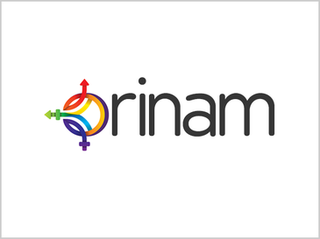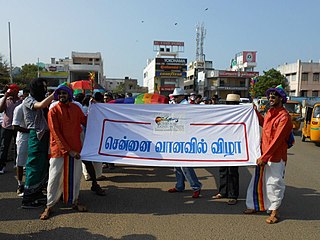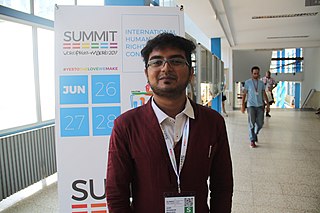Related Research Articles

The American College, often referred to as American College, is one of the oldest colleges in India, located in Madurai, Tamil Nadu. It was founded in 1881 by American Christian missionaries. The red-brick buildings, in the Saracenic style, blend with the natural surroundings constructed by British architect Henry Irwin. Century-old buildings Main Hall, James Hall and Washburn Hall show the heritage of the college.
Hindu views of homosexuality and LGBT issues more generally are diverse, and different Hindu groups have distinct views.
Homosexuality in India is legally permitted by most of the traditional native philosophies of the nation, and legal rights continue to be advanced in mainstream politics and regional politics. Homosexual cohabitation is also legally permitted and comes with some legal protections and rights.

Lesbian, gay, bisexual, and transgender (LGBT) people in India face legal and social challenges not experienced by non-LGBT people. There are no legal restrictions against gay sex or gay expression within India. Same-sex couples have some limited cohabitation rights, colloquially known as live-in relationships. However, India does not currently provide for common law marriages, same-sex marriage, civil unions, guardianship or issue partnership certificates.

Lesbian, gay, bisexual and transgender (LGBT) rights in Tamil Nadu are the most progressive among all states of India. Tamil Nadu was the first state in India to introduce a transgender welfare policy, wherein transgender individuals can access free gender affirmation surgery in government hospitals and various other benefits and rights. The state was also the first to ban forced sex-selective surgeries on intersex infants, and also the first state to include an amendment in its state police guidelines that expects officers to abstain from harassing the LGBTQIA+ community and its members. The state also became the first to ban conversion therapy as well as the first to introduce LGBTQIA+ issues in school curricula.

India has a long and ancient tradition of culture associated with the LGBTQ community, with many aspects that differ markedly from modern liberal western culture.

Anjali Gopalan is an Indian human rights and animal rights activist. She is the founder and executive director of The Naz Foundation (India) Trust, an NGO initially established to address the HIV/AIDS epidemic in India. Gopalan began working on issues related to HIV/AIDS and marginalized communities in the United States.
This is a timeline of notable events in the history of non-heterosexual conforming people of South Asian ancestry, who may identify as LGBTIQGNC, men who have sex with men, or related culturally-specific identities such as Hijra, Aravani, Thirunangaigal, Khwajasara, Kothi, Thirunambigal, Jogappa, Jogatha, or Shiva Shakti. The recorded history traces back at least two millennia.
Chennai has LGBTQIA cultures that are diverse concerning- socio-economic class, gender, and degree of visibility and politicisation. They have historically existed in the margins and surfaced primarily in contexts such as transgender activism and HIV prevention initiatives for men having sex with men (MSM) and trans women (TG).

Orinam is a non-funded, social, and activist collective that works to enhance understanding of alternate sexualities and gender identities among families, communities and society. It was founded in 2003 in Chennai under the name MovenPick and is one of the oldest collective of its kind in India. People affiliated with Orinam are from or trace their ancestry to the following geo-cultural: People of Tamil Origin from Tamil Nadu, India. Orinam provides a platform for creative expression, personal and social commentary by Queer people of Tamil Origin and of Indian Origin primarily. Orinam also acts as a local support group in Chennai for the queer community. Orinam also partners with the city-, state- and national initiatives around decriminalisation of homosexuality by amending Section 377 of the Indian Penal Code and LGBTQ rights.

The Chennai Rainbow Pride March has been held by members of Tamil Nadu LGBTIQA+ communities every June since 2009. The pride march is organised under the banner Tamil Nadu Rainbow Coalition, which is a collective of LGBT individuals, supporters, and organizations working on human rights and healthcare for the LGBTQIA community. The Pride March occurs on the final Sunday of June every year. The Pride March is usually preceded by a month-long series of events organized by NGOs and organizations to inculcate awareness and support for the LGBTQ community, such as panel discussions, film screenings, and cultural performances. The Chennai Vaanavil Suyamariyadhai Perani a.k.a. Chennai Rainbow Self-Respect March is known for being inter-sectional in nature as it addresses issues with multiple axes such as caste, class, religion coupled with gender discrimination.

Lesbian, gay, bisexual and transgender (LGBT) people in Kerala face legal and social difficulties not experienced by non-LGBT persons. However, Kerala has been at the forefront of LGBT issues in India after Tamil Nadu. It became one of the first states in India to establish a welfare policy for the transgender community and in 2016, proposed implementing free gender affirmation surgery through government hospitals. Same-sex sexual activity has been legal since 2018, following the Supreme Court ruling in Navtej Singh Johar v. Union of India. In addition, numerous LGBT-related events have been held across Kerala, including in Kochi and Thiruvananthapuram. However, there is also increasing opposition to LGBT rights recently as evidenced by the anti-LGBT campaigns spearheaded by meninist groups and Muslim organisations like Indian Union Muslim League, Samastha and Jamaat-e-Islami.
S Swapna, is the first transgender Gazetted Officer in India. She is also the first transgender person to take the civil services TNPSC recruitment exam for public service employees in the Tamil Nadu state. Swapna is serving as Assistant commissioner of Commercial Tax Department in Tamil Nadu.

Gopi Shankar Madurai is an Indian equal rights and Indigenous rights activist. Shankar was one of the youngest, and the first openly intersex and genderqueer statutory authority and one of the candidates to contest in 2016 Tamil Nadu Legislative Assembly election. Shankar is also the founder of Srishti Madurai Student Volunteer Collective. Shankar's work inspired the Madras High Court to direct the Government of Tamil Nadu to order a ban on forced sex-selective surgeries on intersex infants. In December 2017, Shankar was elected to the executive board of ILGA Asia. In August 2020, the Ministry of Social Justice and Empowerment appointed Shankar as the South Regional representative in the National Council for Transgender Persons.
Tamil sexual minorities are Tamil people who do not conform to heterosexual gender norms. They may identify as LGBTQIA. It has been estimated that India has a population of 2.5 million homosexuals, though not all of them are Tamil, and not all Tamils live in India.
Srishti Madurai was established on 2 September 2011 by Gopi Shankar Madurai as the first genderqueer and LGBT student volunteer group designed to address the problems of LGBT people in the non-metro cities of Tamil Nadu. In October 2011 Srishti Madurai launched India's first helpline for intersex, genderqueer, and LGBT people at Madurai. In June 2013 the helpline turned to offer service for 24 hours with a tagline "Just having someone understanding to talk to can save a life". Srishti Madurai also organized Asia's first Genderqueer Pride Parade at Madurai.

Arun Kumar &Anr. versus Inspector General of Registration&Ors. (2019) is a decision of the Madras High Court which recognised trans woman as a "bride" within the meaning of the Hindu Marriage Act 1955 and prohibited genital-normalizing surgery for intersex infants and children except on life-threatening situations.
References
- ↑ Shrikumar, A. (2013-10-18). "No more under siege". The Hindu. Chennai, India.
- ↑ "We salute you! - Men of India" . Retrieved 2019-06-04.
- ↑ Rangayan, Sridhar (2013-08-21). "Queer Madras of the mid-1980s, and sundry musings on sexuality". orinam. Retrieved 2019-06-04.
- 1 2 "SAATHII:: Gender & Sexuality > Chennai". saathii.org. Retrieved 2019-06-04.
- ↑ "Probe ordered into abuse of transgender teen". The Hindu. 2006-11-22. ISSN 0971-751X . Retrieved 2019-06-04.
- ↑ "Jayalakshmi vs The State Of Tamil Nadu on 10 July, 2007". indiankanoon.org. Retrieved 2019-06-04.
- ↑ "International AIDS Society - Abstract - 200719804". archive.is. 2014-07-09. Archived from the original on 2014-07-09. Retrieved 2019-06-04.
- ↑ "Reel Desires CIQFF 2014: LGBT film festivals in Chennai: a brief history". 2014-07-14. Archived from the original on 2014-07-14. Retrieved 2019-06-04.
- ↑ Gentleman, Amelia (2008-02-20). "Tackling a Society's Boundaries, on TV and in a Family". The New York Times. ISSN 0362-4331 . Retrieved 2020-01-13.
- ↑ "Harassed lesbian couple ends life". The Times of India. 18 May 2008. Retrieved 2020-01-13.
- ↑ "Interrogating aravani activism in Tamil Nadu". Archived from the original on 2014-02-13. Retrieved 2020-01-13.
- ↑ "Gay wedding irks South African Hindus". NDTV.com. Retrieved 2017-12-09.
- ↑ Frederick, Prince (2009-09-01). "Portal to bliss". The Hindu. ISSN 0971-751X . Retrieved 2020-01-13.
- ↑ "Festival with Hollywood flavours". The Hindu. 2009-06-23. ISSN 0971-751X . Retrieved 2020-01-13.
- ↑ "'Hinduism does not condemn homosexuality' - Rediff.com India News". news.rediff.com. Retrieved 2017-12-09.
- ↑ "Homosexuality, medicine and psychiatry". The Hindu. 2009-07-25. ISSN 0971-751X . Retrieved 2020-01-13.
- ↑ "Rainbow over the Marina". The Hindu. 2009-06-30. ISSN 0971-751X . Retrieved 2020-01-13.
- ↑ First Meet of LGBT Parents
- ↑ "Christianity". orinam. Retrieved 2020-01-13.
- ↑ "Nritya Choodamani Awardees Gallery". krishnaganasabha Org. krishnaganasabha. Archived from the original on 2013-01-01. Retrieved 18 August 2019.
- ↑ "At last lesbians in the city find their space". The New Indian Express. Retrieved 2020-01-13.
- ↑ "The eight lives taken from Toronto's Gay Village" . Retrieved 2018-08-29.
- 1 2 3 "One Who Fights For an Other". The New Indian Express. Archived from the original on May 19, 2015.
- ↑ "Chennai Dost". Chennai Dost. Retrieved 2015-09-06.
- ↑ Vasundara, R. (25 July 2011). "Clubs for gays spring up on Chennai campuses". The Times of India. Retrieved 2020-01-13.
- ↑ "Chennai protests Health Minister Azad's homophobic remarks, July 5, 2011". orinam. 2011-07-05. Retrieved 2020-01-13.
- ↑ D. Karthikeyan, "Madurai comes out of the closet", The Hindu, July 30, 2012.
- ↑ "Lesbian, Gay, Bisexual and Transgender community seeks to increase support base", The Times of India, July 29, 2012.
- ↑ Gopi Shankar Madurai, "Making themselves heard", The Hindu, 5 July 2012.
- ↑ Ramya, M. (24 February 2013). "IIT-Madras: IIT-Madras to give ear to homosexuality issues". The Times of India. Retrieved 2020-01-13.
- ↑ "24-hour helpline launched for LGBTs in Madurai", Times of India, July 10, 2015.
- 1 2 Shrikumar, A. (23 October 2014). "Making gender flexible". The Hindu.
- ↑ "India's Supreme Court upholds colonial-era anti-gay sex law". Fox News. 2013-12-11. Retrieved 2017-12-09.
- ↑ "Orinam Section 377 - Hues may vary but humanity does not - Bharathiyar". Orinam Section 377. Retrieved 2020-01-14.
- ↑ "It's a great honour to be awarded for book on gender variants: Gopi Shankar", The Times of India, July 21, 2014.
- ↑ "BJP supports TN leader book on LGBT". The Asian Age. 2014-07-10. Archived from the original on 2014-08-08.
- ↑ Gladwin Emmanuel,"BJP Leader Launches LGBT Rights Book in TN", Mumbai Mirror, 11 July 2014.
- ↑ Chowdhry, Seema (2014-02-08). "The Love Issue | Sealed with a kiss". Livemint. Retrieved 2020-01-14.
- ↑ "Homophobic Christian Rally: Chennai, Jan 5 2014". orinam. 2014-01-05. Retrieved 2020-01-14.
- ↑ Bharadwaj, Anirudh (2014-01-09). "'Christians Against Homophobia' Group Formed In Chennai". Gaylaxy Magazine. Retrieved 2020-01-14.
- ↑ "FTM and Intersex inclusion in NALSA? Jackuline Mary vs. The Superintendent of Police, Karur". orinam. 2014-05-06. Retrieved 2020-01-14.
- ↑ Sreevatsan, Ajai (2014-11-06). "Paving the path to an equal society". The Hindu. ISSN 0971-751X . Retrieved 2020-01-14.
- ↑ "Rainbow Film Fest Returns to Town". Archived from the original on December 13, 2015. Retrieved 2015-09-06.
- ↑ "List Intersex in Transgender Bill, Urges NGO". Archived from the original on August 30, 2015.
- ↑ "India urged to include intersex people in bill protecting trans rights". 29 August 2015.
- ↑ "Intersex person to contest from Madurai North - TAMIL NADU". The Hindu. 2016-04-30. Retrieved 2016-05-22.
- ↑ Priya Menon (2016-04-22). "3rd gender gets a new champion in Tamil Nadu poll ring - Times of India". Timesofindia.indiatimes.com. Retrieved 2016-05-22.
- ↑ Priya Menon (2016-05-10). "Intersex candidate alleges harassment - Times of India". Timesofindia.indiatimes.com. Retrieved 2016-05-22.
- ↑ "This intersex person is contesting TN polls, 'ze' wants to change your mind on sexual minorities". The News Minute. 2016-04-24. Retrieved 2016-05-22.
- ↑ Subramani, A. (31 January 2016). "Shouldn't LGBT people's rights and privacy be protected, Madras HC asks Centre". The Times of India. Retrieved 2020-01-14.
- ↑ "RSS flip-flop on homosexuality indicates gay men in India remain in exile, writes Ashok Row Kavi". 19 March 2016.
- ↑ Vannan, Gokul (2016-03-11). "Transgenders to take poll plunge". Deccan Chronicle. Retrieved 2020-01-14.
- ↑ "LGBT activists hold candlelight vigil in Chennai for Orlando victims". www.tamilnadulgbtiq.in. Retrieved 7 June 2016.
- ↑ "Awesome! This Tamil Nadu seminary is teaching pastors to accept the LGBT community". 15 July 2016.
- ↑ "Gender rights activist shortlisted for international award | Madurai News - Times of India". The Times of India . 21 October 2016.
- ↑ "Finalists of 2016 Commonwealth Youth Worker Awards announced". 27 October 2016.
- ↑ Kamini Mathail (23 May 2017). "LGBT community symposium seeks a level playing field at workplace". TOI. Retrieved 3 July 2017.
- ↑ Michiel Kolman (13 June 2017). "Symposium spotlights LGBT workplace inclusion in India". Elsevier. Retrieved 3 July 2017.
- ↑ Abinaya Kalyanasundaram (17 May 2017). "Ain't nothing wrong with being a drag!". New Indian Express. Retrieved 3 July 2017.
- ↑ "Chennai Pride's guide to handle online harassment for the LGBTQIA+ -". 2017-06-16. Retrieved 2017-07-10.
- ↑ M Suganth (31 March 2017). "This Lesbian Anthem sings a tune of change". TOI. Retrieved 3 July 2017.
- ↑ "SL committed to non-discrimination based on sexual orientation: Nerin Pulle". www.dailymirror.lk. Retrieved 2020-01-14.
- ↑ ""Transwoman A 'Bride' Under Hindu Marriage Act": Madras HC; Also Bans Sex Re-Assignment Surgeries On Intersex Children [Read Judgment]". 23 April 2019. Retrieved 2019-04-24.
- ↑ ""Ban sex reassignment surgeries on intersex infants Madras High Court tells Tamil Nadu Govt" - The News Minute". 23 April 2019. Retrieved 2019-04-24.
- ↑ "Ruling on intersex infants: Madurai activist comes in for praise by High Court". The Times of India . 24 April 2019. Retrieved 2019-04-24.